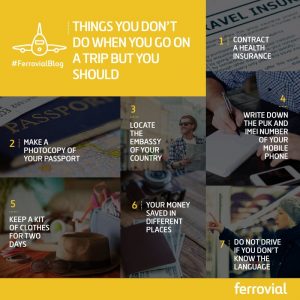
Without wanting to be killjoys, here are a few tips for all those things you should do when you travel, but almost certainly don’t
- Take out medical insurance or get the European Health Card. If you’re travelling abroad take out medical insurance. Otherwise, get travel insurance which covers not just health and accidents, but also theft and assistance outside your country. Another option, if you’re from the EU, is to apply for the Health Card, which will give you health cover in any European country.
- Make a photocopy of your passport. Leave your passport in the hotel safe and take a photocopy of it out with you. This is the best way of ensuring that, should you lose your belongings, at least you’ll be able to get home without any hassles. And while you are at the photocopier, it’s a good idea to make a copy of your national ID card, travel insurance policy, driving licence and credit cards.
- Find out where your country’s embassy or consulate is. Note down the address of the embassy or consulate of your country in case you need it. And if you’ve followed our previous piece of advice (about photocopying your passport), you’ll see how much quicker everything gets sorted out.
- Make a note of your mobile phone PUK and IMEI codes. In the event of you getting locked out of your mobile, you will need the PUK code to unlock it. And if your phone gets lost or stolen, the IMEI code is important for you to remotely lock the phone so nobody can use it.
- Pack a two-day change of clothes kit. Hopefully your luggage won’t get lost, but if you do check a bag in, take a two-day change of clothes in your hand luggage to tide you over till you get your lost luggage back.
- Keep money in different places. Pack the money you’re taking in different places. For instance, in your backpack, handbag, wallet, and spread it among any reliable people you’re travelling with. When you get there, work out a budget and leave any money you aren’t going to be using in the hotel safe.
- If you’re going to a country where you don’t speak the language, we would advise you not to drive. Although there’s no reason for anything to go wrong, if you don’t speak the language, don’t drive, especially in those countries where it’s difficult to communicate either in English or your native language. If you had an accident you would have trouble expressing yourself and could run into trouble. For example, if you go to India it’s best to hire a car with a chauffeur.
If you’ve read the whole of this post and decide to take no notice of our recommendations, we hope it all goes well. Tell us on Facebook!






There are no comments yet